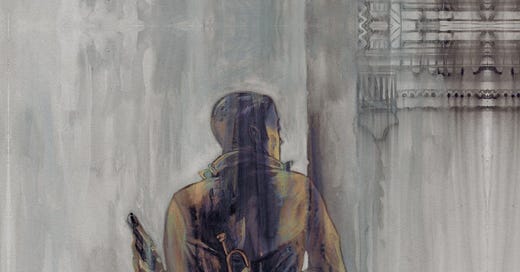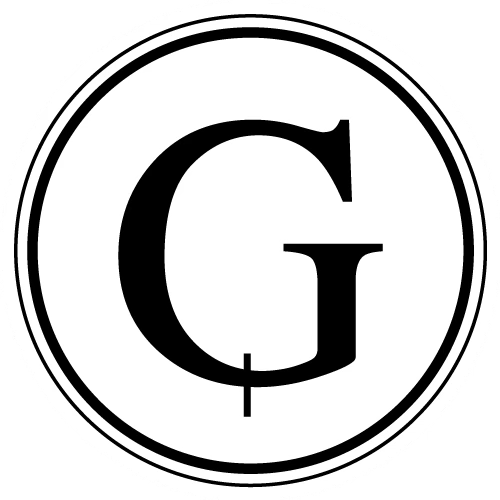What follows is Part 49 of Becoming P.T. Lyfantod
If you missed Part 1, start there:
When school broke for winter holidays, we put on optimistic fronts, promising to use the time to search for the stone, but privately we despaired. After our initial, obvious discoveries, no matter how much we read of Arthur, Avalon, or Illtud the Knight, the rest of the riddle eluded us. It grew easier each day to imagine a future as one-trick ponies; consummate performers of Lightfoot’s Disarming Lilt and nothing else, left with the knowledge that somewhere out there, there was a second stone, and we’d failed to find it.
Come Christmas morning, I found a single box under the tree, in red-and-gold wrapping. Mam-gu watched apprehensively as I undid the ribbon and tore the paper away.
“It isn’t new…”
Inside was a worn, hard-shell case; peeling black leather with tarnished silver fixtures. I undid the clasps and raised the lid. Inside, a battered old horn rested on a plush bed of emerald-green velvet. It was dinged, scuffed, dirty, and had clearly seen better days.
“It’s perfect,” I said. And I meant it.
It was better, I thought, having an instrument that wasn’t pristine. It’d lived, and seen the world, and who knew what share of adventure. It had character. History. And if it got bumped now and again, it wouldn’t be the end of the world. I gave it a wash and a good polishing, and beneath that patina of age, it didn’t look half bad. It was sturdy, and the buttons slid smoothly. The maker’s mark was engraved on the bell, a single word, in straight, chiseled letters: Aeolus. I fashioned a strap by looping an old belt through the middle, so that when I slung it over my shoulder, the trumpet hung ready at my side. Lightfoot had his horn…And now, I had mine.
Of course, there was still the matter of learning to play the thing. I spent much of my holiday trying, with little success. My embouchure—
“Your what now?” said Rudy.
“The way you use your mouth when you’re playing.” I replied. “It’s French.”
—my embouchure was all wrong. I couldn’t seem to keep my lips inside the mouthpiece, tiny after the tuba. When school resumed a week later, I’d hardly improved at all.
Between the intractable horn, the unsolvable riddle, and the drudgery of returning to classes, I started the new year sullen and discouraged, and my friends fared little better. It was a moody, quiet bunch that sat around the table one Friday night, our alter egos huddled over a flickering blue projection of the Seer Sorceress Clara asking us for help, when Stuart slapped his forehead, cutting Iain off mid-monologue. “We’re so stupid.”
“What do you mean?” said Merry.
“The riddle. We been going about it all wrong.”
“How’s that?” Iain asked, battling annoyance at being interrupted.
“All these clues…” Stuart shook his head. “We should’ve started with the stone.”
Tom leaned back in his chair. “I don’t follow.”
“People study standing stones. Visit them. There’s a whole museum of them at Margam. Margam Country Park,” he added at the blank looks from Tom and Merry. “There’s bound to be a… registry or something. Somewhere. We find that, and look for local stones related to the other stuff… That’s how we’ll find it. Not reading everything ever written about King Arthur.”
“It does seem obvious when you put it that way,” I said.
“You may be onto something…” Iain begrudged.
“We’ll start with the libraries,” Merry sighed. “And if there’s nothing—”
“Maybe they’d have something at Margam Park,” said Stuart. “It’s only an hour by bus. Give or take.”
“It’s a start,” I nodded. “What’ve we got to lose?”
“It’s settled then,” Tom slapped the table. “You hit the books, and if that doesn’t pan out, we’ll take a trip to Margram.”
Chapter Sixteen:
A Trip to Margam Park
We spent Saturday at the library, poring over any book Marion could find mentioning standing stones. These came in two types. There were the dry archeological tomes, with tedious accounts of excavations, rambling analyses, and appendices twice as long as the principal text; and the spiritual, new-agey, nonsense books I’d come to expect from anything even tangentially related to magic. The worst was a thankfully thin volume entitled The Ancient & Mysterious Starstones, which we only picked up at all because there was a photograph of a stone on the cover. It put forth the questionable thesis that the menhir were left as a map of the universe by “ancient aliens.” Come evening, we knew more about standing stones than any of us wanted to, and were thoroughly convinced none of the books would tell us what we needed to know. It fell to Plan B.
But between Iain’s job, Merry’s church, Tom’s practice, and Stuart’s refusal to put any less than maximum effort into school projects, finding a day that worked for everyone was nearly as difficult as finding the stone itself. And then there was the matter of Merry’s parents, who’d recently figured out that Tom was more than another friend. To say they were displeased—
“Did they think she was, you know…” Coira asked.
“What?” said Rudy.
“You wouldn’t understand.” She lifted her chin. “You’re too young.”
He squinted at her. “Are you talking about sex?”
I goggled at him. “Oh my god, Rudy! Why do you even know that word?”
“I’m not a baby. In fact—”
I threw up my hands. “That’s enough of that! Yes, I suppose it was partially about erhm… That. But it was also because of Tom’s father.”
“What about him?”
“Mr. Firth was proud heir to the biggest used car dealership in West Glamorgan. And aside from reminding everyone of it every chance he got, he was of the mind that his relative success made his opinions more valid than everyone else’s. And he had plenty.”
“Like what?”
“I definitely recall Mam-gu complaining about him more than once after PTA meetings. But the incident I remember best must have happened when I was around ten. A group of local kids had organized and petitioned the city for a skatepark. Somehow Tom’s dad caught wind and concluded it was a waste of taxpayer money. He started a campaign against it. Ran paid adverts painting skateboarders as wheelie hooligans. He found where some of the kids hung out and harassed them there for weeks. He even got into a fistfight with a taller-than-average fourteen-year-old. In the end, thanks to his efforts, the skatepark was never built.”
“Wow. Tom’s dad sucks.”
“Yes. He does. Did. In the end, Merry’s mother agreed, but only after buying all of our bus tickets herself. That way she could be sure we we’d go where we said we would.”








